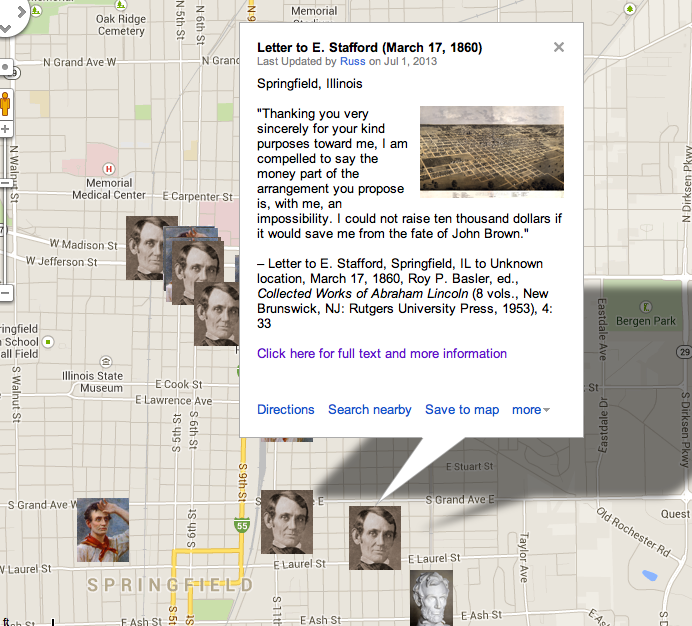Ranking
#125 on the list of 150 Most Teachable Lincoln Documents
Annotated Transcript
On This Date
HD Daily Report, March 17, 1860
The Lincoln Log, March 17, 1860
Custom Map
How Historians Interpret
“Lincoln turned down suggestions to use money to help line up delegates. His friend Mark W. Delahay had complained to him that Seward spent freely to win support in Kansas and that ‘we, your friends, are all very poor,’ and hinted that ‘a very little money now would do us and you a vast deal of good.’ Lincoln would have none of it: ‘I can not enter the ring on the money basis – first, because in the main, it is wrong; and secondly, I have not, and can not get, the money.’ Yet, he added, ‘for certain objects, in a political contest, the use of some, is both right, and indispensable.’ So saying, he agreed to give Delahay $100 to enable him to attend the Chicago convention, assuming that he would be chosen a delegate. In fact, Delahay and all other Lincoln supporters in Kansas were defeated. Upon learning of this development, Lincoln advised Delahay not to stir the Seward delegates ‘up to anger, but come along to the convention, and I will do as I said about expenses.’ The following day, Lincoln told a correspondent who had proposed some scheme involving the expenditure of $10,000: ‘I could not raise ten thousand dollars if it would save me from the fate of John Brown. Nor have my friends, so far as I know, yet reached the point of staking any money on my chances of success.’”
–Michael Burlingame, Abraham Lincoln: A Life (2 volumes, originally published by Johns Hopkins University Press, 2008) Unedited Manuscript by Chapter, Lincoln Studies Center, Volume 1, Chapter 14 (PDF), 1625-1626.
“During most of the nineteenth century, presidential candidates did not campaign openly; the post was supposed to seek the man. Lincoln remained true to that tradition, but a number of managers pushed his campaign… When E. Stafford suggested that Lincoln raise a campaign chest of $10,000, the candidate replied “’I could not raise ten thousand dollars if it would save me from the fate of John Brown. Nor have my friends, so far as I know, yet reached the point of staking any money on my chances of success.’”
–Lowell H. Harrison, Lincoln of Kentucky (Lexington: The University Press of Kentucky, 2000).
NOTE TO READERS
This page is under construction and will be developed further by students in the new “Understanding Lincoln” online course sponsored by the House Divided Project at Dickinson College and the Gilder Lehrman Institute of American History. To find out more about the course and to see some of our videotaped class sessions, including virtual field trips to Ford’s Theatre and Gettysburg, please visit our Livestream page at http://new.livestream.com/gilderlehrman/lincoln
Searchable Text
Springfield, Illinois, March 17, 1860.
Dear Sir: Reaching home on the 14th instant, I found yours of the 1st. Thanking you very sincerely for your kind purposes toward me, I am compelled to say the money part of the arrangement you propose is, with me, an impossibility. I could not raise ten thousand dollars if it would save me from the fate of John Brown. Nor have my friends, so far as I know, yet reached the point of staking any money on my chances of success. I wish I could tell you better things, but it is even so. Yours very truly,
A. LINCOLN.

